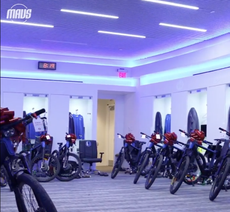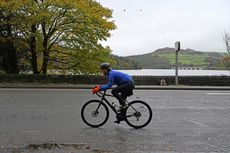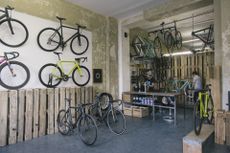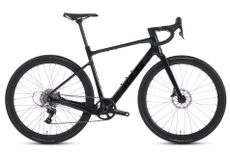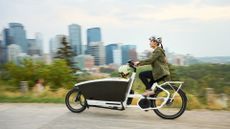Yes, the e-bike is an oddity in a land ruled by the automobile but it is the future
Today, trapped in a sea of parking spaces, this future feels far off, if not impossible. But it is nonetheless very visible, and that is making us a bit uncomfortable.
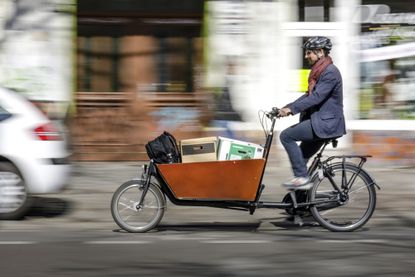
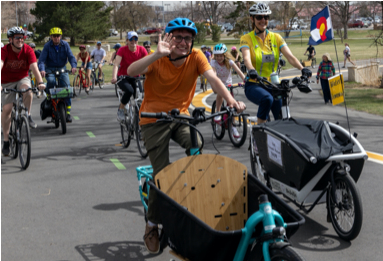
It usually happens in between taking off the lock and putting on my helmet. I’ll hear a voice. “That’s quite a machine!” one man said. “What do you use that for?” asked another. And “Is it hard to steer?” is a common question.
Of course, I’m always happy to answer. I ride a Yuba electric cargo bike. Of all the bicycles that people regularly encounter in the U.S, very few have encountered cargo bikes. But more and more people are familiar with e-bikes, and “is it electric?” has become a very common question. More and more, when I step away from the bike rack, someone else rolls up on their own e-bike.
The many conversations that I have with people on the street about my e-bike are revealing and fascinating. Some people ask me, perhaps having just stepped out of a chilly SUV, if I get hot riding around in the summer. So far, I respond, with the help of a light breeze and the bike’s electric motor, I have been able to stay pretty cool. Others, maybe having sat in traffic in order to make a journey down the street, ask if I am often late when I ride my bike. Without any traffic to worry about, and the steady whirr of the gearbox, I normally make good time. A few, seeing just how much space I have to haul things, have remarked that they could use a similar vehicle to carry their kids to school or their pets to the park. But they are hesitant to do so because they wouldn’t feel safe making such a journey.
These questions, and the response that e-bikes and cargo bikes have had in popular media, remind me how such a bike is quite an oddity in a land ruled by the automobile. Car culture is far more than the idea that muscle cars and exotic sports cars are cool. It is the way that automobiles physically dominate a majority of the space in our cities and suburbs. Car culture is how, for many Americans, a journey using a mode other than driving isn’t just unfavorable, it isn’t even considered in the first place. The reasons why it is so hard to hop on the bus or casually ride a bike to your destination are complicated and frustrating, so we instead have a wide range of simpler shared myths about naughty cyclists, distracted pedestrians, and empty buses.
E-bikes are a potent challenger to these cultural myths. In almost every way, they disrupt the notion of transportation that is imposed by the automobile, being relatively cheap, easy to operate, and space and energy-efficient. They show that transportation doesn’t need to be stressful, wasteful, or a vehicle for ostentatious displays of status or power. They are humble and quiet. Their operation is not tied to the volatile price of oil and gasoline. E-bikes provide a relief to the maddening societal apparatus that compels Americans to own an expensive and dangerous climate change machine in order to simply regain their natural right to mobility. E-bikes represent the future.
Such a future is one that could look and feel radically different from the world that we are accustomed to. Many omnipresent aspects of our lives are driven by transportation: the way our homes are built, the sounds and smells outside our doors, our mood when we arrive at work or the grocery store, our morning routine. A future that de-centers automobiles and creates balance between different modes would be one that is quieter, less anxiety inducing, more joyful. It could be one where we have fewer parking spaces and more parks, fewer garages and more gardens. E-bikes have the power to transform not just our personal transportation but also commercial deliveries and shipping. Today, trapped in a sea of parking spaces, this future feels far off, if not impossible. But it is nonetheless very visible, and that is making us a bit uncomfortable. (Ian Bogost's recent Atlantic article is a good example of that discomfort.)
Every time I get a question about my bike I am so excited to respond and have a conversation with someone because I can tell that they can see this future as well. Is there anything cooler than the future? It can be hard to examine something as simple as how you think about transportation, and then realize that there is so much more to be seen and experienced. We might get caught up in all of the contradictions that we have imposed on ourselves, all of the dissonance and myth-making that surrounds transportation, but the benefits of e-bikes will still be there. As long as e-bikes offer joy, freedom, mobility, and convenience, we will have the option to beat the traffic.

Thank you for reading 20 articles this month* Join now for unlimited access
Enjoy your first month for just £1 / $1 / €1
*Read 5 free articles per month without a subscription

Join now for unlimited access
Try first month for just £1 / $1 / €1
Get The Leadout Newsletter
The latest race content, interviews, features, reviews and expert buying guides, direct to your inbox!

Evan is a mobility and housing advocate in Denver, Colorado. During the day he writes software. Away from the computer he is riding his bike, trying a new restaurant, or grooving at the roller rink.
-
 'I had to wait at the top of every hill' – the highs and lows of Malcolm Elliott's career in the fast lane
'I had to wait at the top of every hill' – the highs and lows of Malcolm Elliott's career in the fast laneThroughout his two-part career, no-one epitomised Sheffield steel like Cycling Weekly's 2023 Lifetime Achievement award winner Malcolm Elliott
By James Shrubsall Published
-
 'I never wanted to be known as the TikTok cyclist' - how Alison Jackson wrote her legacy at Paris-Roubaix
'I never wanted to be known as the TikTok cyclist' - how Alison Jackson wrote her legacy at Paris-RoubaixThe Canadian tells Cycling Weekly how a day across the cobbles of northern France changed her career
By Tom Davidson Published
-
 NBA Star Luka Dončić gifts Mercedes-brand e-bikes to entire Dallas Mavericks team and staff
NBA Star Luka Dončić gifts Mercedes-brand e-bikes to entire Dallas Mavericks team and staffNBA Star Luka Dončić surprised his Dallas Mavericks teammates and staff for the holidays with yet-to-be-released Mercedes-brand Rallye Edition e-bikes, which retail for as much as $7,500.
By Kristin Jenny Published
-
 Opinion: Why I won't be doing the Festive 500 this year, or probably ever
Opinion: Why I won't be doing the Festive 500 this year, or probably everThe idea of suffering over the Christmas period for fun is not an attractive one to me
By Adam Becket Published
-
 Bike sales hit new historic low as cost of living crisis bites
Bike sales hit new historic low as cost of living crisis bitesCurrent sales volume below 20-year nadir, indicates Bicycle Association
By Tom Davidson Published
-
 New $2,300 carbon-framed performance e-bike sees Ride1Up venture into drop bar territory
New $2,300 carbon-framed performance e-bike sees Ride1Up venture into drop bar territoryThe CF Racer1 is Ride1Up's first drop bar-style e-bike and is priced thousands of dollars below similar models from competitors. The bike comes in both road and gravel model options.
By Kristin Jenny Published
-
 New York City landlords ban e-bikes inside buildings — is this the new norm?
New York City landlords ban e-bikes inside buildings — is this the new norm?Following numerous e-bike fires, injuries and deaths, New York City landlords ban e-bikes inside buildings. Is this the new norm?
By Kristin Jenny Published
-
 A modern era: E-bikes are replacing horse and buggy for some Amish communities
A modern era: E-bikes are replacing horse and buggy for some Amish communitiesAlthough typically non-adopters of new technology, some Amish communities are embracing e-bikes for transportation.
By Kristin Jenny Published
-
 Opinion: Cycling has an inclusivity problem
Opinion: Cycling has an inclusivity problemThe abuse of an American crit rider shows just how far we have to go as a sport to be more equitable and open
By Adam Becket Published
-
 E-bike rebates: Are you taking advantage of your city or state programs?
E-bike rebates: Are you taking advantage of your city or state programs?A nation-wide rebate program could be coming soon but here’s how to save on an e-bike purchase now
By Charles Miller Published


